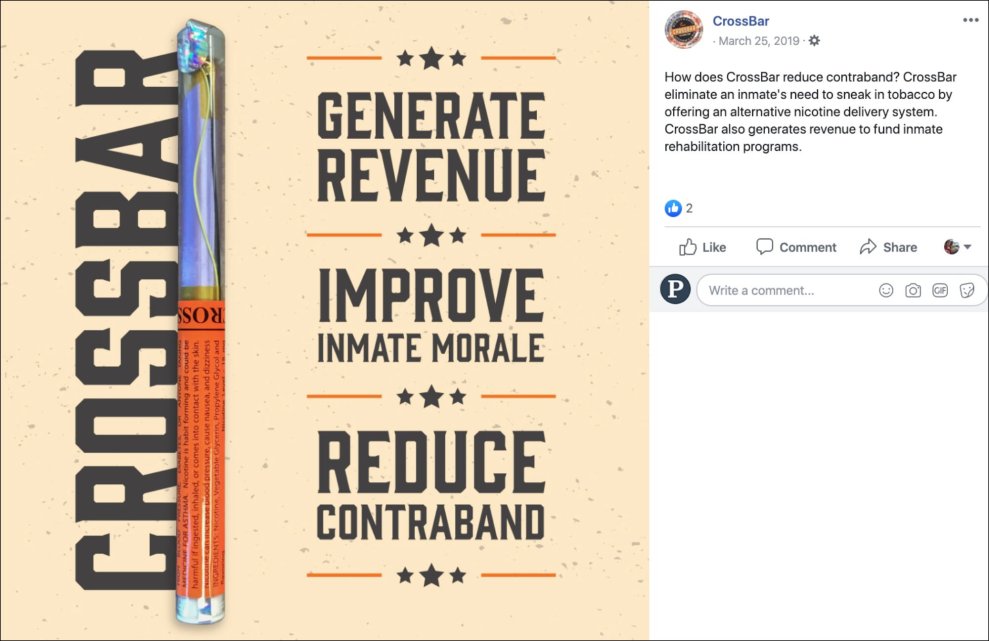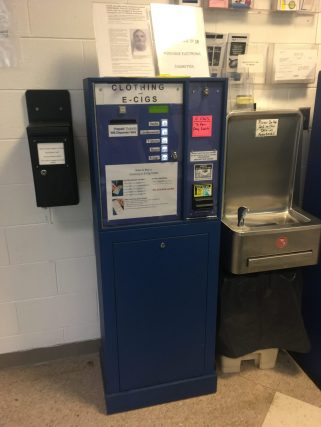
The vapor cloud produced by a man with an e-cigarette in London. Yui Mok/ZUMA
This story was published originally by ProPublica, a nonprofit newsroom that investigates abuses of power, and the Kentucky Center for Investigative Reporting, a member of the ProPublica Local Reporting Network. Sign up for ProPublica’s Big Story newsletter to receive stories like this one in your inbox as soon as they are published.
A Kentucky river city once rich in tobacco was grappling with growing concerns about the health risks of electronic cigarettes.
The former governor had already banned e-cigarettes in some state buildings, and lawmakers had prohibited selling them to anyone younger than 18.
So, in May 2017, city leaders in Henderson decided to add vaping to a more than decade-old ban on smoking in local government buildings and other public places.
The prohibition meant a loss of revenue for the Henderson County Detention Center, which purchased e-cigarettes and then resold them to inmates at triple or quadruple the wholesale price.
It also threatened a steady stream of business for the jail’s supplier, CrossBar Electronic Cigarettes. That posed a problem for Jamie Mosley, a jailer across the state who runs the Laurel County Correctional Center.
Mosley invented the e-cigarettes sold at the jail, and his wife, Kristie Mosley, is listed in state records as an owner of the company.
Less than two months after the ban was enacted, Mosley drove 250 miles to the western Kentucky city along the Ohio River to join the county’s jailer in seeking an exemption for the jail. Mosley said the e-cigarettes he developed were safer than competing products because they couldn’t be fashioned into weapons. He also used his jail as an example, saying e-cigarettes improved morale and curbed fighting.
In the end, the Henderson jail was allowed to keep the revenue driver, which brought nearly $150,000 in profits the previous year, and CrossBar remained its e-cigarette supplier.
Mosley is one of at least four elected Kentucky jailers who have capitalized on the e-cigarette boom, either by forming companies that sell vaping products to inmates in other jails or by handing lucrative business in their own facilities to friends and family, the Kentucky Center for Investigative Reporting and ProPublica have found. He and other jailers also have successfully fought the few proposed health measures that would have put such business in peril.
The stakes are high for CrossBar. A 2018 article from Vice News, which featured Mosley, estimated that the company would make $3.5 million in e-cigarette sales that year. Mosley declined to confirm the figure or give updated sales numbers, but records provided by 12 Kentucky jails show more than $356,000 in payments to the company in 2018.
Many cash-strapped jails prop up their budgets by purchasing e-cigarettes from suppliers and reselling them to inmates.
Those e-cigarette sales brought in more than $1.3 million in 2018 to nearly two-thirds of the state’s jails, according to data shared with KyCIR and ProPublica in response to requests under the state open records act. The remaining third didn’t provide information.
Seven jails reported netting more than $100,000 apiece.
Profits from e-cigarettes often outweigh health concerns for thousands of inmates in Kentucky, even when jailers, their friends and their families don’t personally benefit.

A post from the Facebook page of CrossBar, which sells e-cigarettes to Kentucky jailers. Jamie Mosley invented CrossBar’s e-cigarettes and is also an elected jailer in the state.
Money Beats Out Health Concerns in Kentucky Jails
Kentucky is still sorting through a complicated history with tobacco. The crop was essential to the economy for more than a century, and the state has one of the nation’s highest rates of adult smokers. It’s also at the top of the list when it comes to cancer deaths.
A statewide ban on smoking tobacco in workplaces or enclosed areas doesn’t exist, leaving those decisions to cities and counties. The state also has been slow to adopt regulations for e-cigarettes, which are facing growing scrutiny nationwide in the wake of increased deaths, a spike in lung injuries and high rates of teenage vaping.
An e-cigarette is a battery-powered device that converts heated liquid nicotine into a mist, or vapor, that the user inhales. Traditional cigarettes, which are not allowed in Kentucky jails, burn tobacco, releasing smoke that contains nicotine.
In 2014, then-Kentucky Gov. Steve Beshear signed an order that prohibited tobacco products and e-cigarettes in some state buildings.
Beshear relied in part on a surgeon general of the Air Force memorandum that warned e-cigarettes “contain and emit harmful chemicals, are currently unregulated and pose known and unknown health risks to users and non-users alike.”
Such health concerns also led to a 2014 ban on e-cigarettes in the state’s prisons, but not in county jails, where officials have vigorously opposed measures that would restrict the use of vaping products.
“The argument I keep hearing is, ‘So-and-so says they reduced incidents of violence and problems in the jail by a tremendous percent, so it’s cost-effective,’” said Kenneth Ray, a consultant and former corrections official, based in Ashland, in northeastern Kentucky. “I think it’s crap. I don’t believe it.”
Ellen Hahn, director of the University of Kentucky’s Center for Smoke-free Policy and a professor of nursing, said jails should be helping to wean inmates off nicotine, not selling products that push them further into addiction.
“Most smokers want to quit, and there are nicotine-replacement products that are safe and effective,” Hahn said. “E-cigarettes are not an approved quit aid.”
Kentucky has 80 operating jails. Of the 61 that provided records to KyCIR and ProPublica, 53 reported selling e-cigarettes to inmates.
Eight reported not allowing them in their facilities. They include the state’s two largest jails, in Jefferson and Fayette counties, and the 297-bed Marion County Detention Center run by Barry Brady.
Brady, whose jail is southeast of Louisville, said it seems contradictory to allow e-cigarettes when a majority of the inmates in his jail are in treatment programs for addiction.
“I don’t want to be a part of continuing on with a product which is legal, but still, it’s addictive and deemed not healthy,” Brady said.
But R.W. Boggs, the jailer in Carter County in northeast Kentucky, rejects those health concerns.
“Heck, I guess just breathin’ causes cancer nowadays,” said Boggs, who ran a company in his wife’s name that several years ago sold $218,000 in e-cigarettes to at least nine other jails. The business was the subject of a yearlong state police investigation in 2014.
No criminal charges were filed as part of the investigation, but Boggs admitted to police that he may have commingled his jail’s e-cigarette supply with what he sold to other jails. He also acknowledged that he “probably” didn’t pay federal taxes on more than $83,000 in profits from the company’s e-cigarette sales in 2012 and 2013.
“A Terrible Appearance of Impropriety”
Kentucky’s conflict of interest law allows state employees, lawmakers and their spouses to form businesses as long as they avoid direct interaction with their offices.
But the law doesn’t apply to Kentucky cities or counties, which are required to adopt their own codes of ethics.
Andrew Hartley, an attorney who advised cities and counties on ethical issues while working with the Kentucky Department for Local Government, said state law should include more specific standards of conduct for local officials.
The rules could always be further strengthened by cities and counties, but there should be a minimum expectation of ethical conduct, Hartley said.
“Every local government should have strong provisions in its ethics code, with real teeth,” Hartley said.
Greenup County Jailer Mike Worthington attracted the attention of state auditors in a report released last year. They found he violated the law by purchasing nearly $50,000 in e-cigarettes from a single company without seeking public bids during the 2017 fiscal year.
The audit didn’t name the company, but purchase records show that the jail’s supplier was Go Long LLC, which is owned by Cheryl Sizemore Gray.
She is Worthington’s former girlfriend and current business partner in C&M Supply, LLC, a company operated from the jailer’s home and that lists wholesale trade as its business, KyCIR and ProPublica found.
Gray, who declined to comment, was new to the e-cigarette business when she became the favored supplier of vaping products for Worthington’s jail.
She was working as a manager at Walmart when she started Go Long LLC in January 2016, according to her LinkedIn page, which does not mention the e-cigarette company she registered with the state. Before that, she was a manager at Family Dollar, where she was employed for 28 years.
Records show that since the initial violation identified by auditors, Worthington has bought an additional $150,000 in e-cigarettes from Gray without bidding. His purchases in 2018 and 2019 exceeded the $20,000 legal threshold government entities were allowed to spend without first seeking public bids, according to records.
Michael Goins, a spokesman for the state auditor, said the office has received an allegation related to the jail’s e-cigarette business with Go Long. He said the information was shared with the accounting firm currently auditing Greenup County’s fiscal court, which oversees spending at the jail.
“We will review their audits once they are completed,” Goins said.
The auditor’s office has no authority to prosecute or sanction violators.
Worthington, whose annual jailer’s salary is more than $101,000, did not respond to numerous requests for an interview. He also ignored the auditors’ request that he submit a plan for correcting the initial violation.
Hartley, now the chief administrative officer for the city of Georgetown in central Kentucky, expressed concern about Worthington’s case and others identified by KyCIR and ProPublica.
“If something doesn’t pass the sniff test, it warrants inquiries into what those facts are and whether there’s a violation,” he said.
Elected jailers in Kentucky run correctional facilities in the state’s counties, while sheriff’s offices focus on other law enforcement duties such as patrolling communities. In most states, jails are the responsibility of the local sheriff.
The Kentucky Jailers Association declined to discuss members’ business dealings with family or friends.
A spokeswoman said the association obtained a legal opinion concluding that nothing prohibits a jailer from conducting business with county government. She declined to share a copy of the opinion.
Worthington is not the only jailer who handed e-cigarette business to companies by sidestepping competition.
Mosley, the Laurel County jailer, did the same when he gave his jail’s business to the manufacturer of the e-cigarettes he developed. He said he didn’t have to seek bids from other companies because the jail’s transactions with the manufacturer represented “a unique opportunity” and didn’t exceed the amount specified in the law.
But records Mosley provided showed that in 2014 and 2015, the jail’s total e-cigarette purchases exceeded the $20,000 limit for no-bid business.
Mosley often blurs the lines between his elected position and CrossBar’s e-cigarette business. He’s featured in a video post on CrossBar’s Facebook page that mentions the company’s ownership, and he, along with Greg Crockett, CrossBar’s executive vice president, are the only two team members listed on its website.
He dismisses concerns about health risks, citing articles such as one by an e-cigarette supplier that says they are “no more dangerous than coffee.”
The company’s logo was emblazoned on trucks Mosley drove in NASCAR races. And he has occupied the company’s booth at jailers conventions, promoting e-cigarettes as a revenue driver and safety tool.
But Mosley said he has no conflict of interest.
He said he’s not involved in the operations of the company, which is owned by his wife. She and Crockett declined to comment.
Mosley also said he receives no income from his jail’s purchase of CrossBar e-cigarettes because he buys them directly from the manufacturer of the product, a Chinese company named ALD Group Ltd.
Records show that the jail has paid ALD more than $133,000 for e-cigarettes since 2012. Company officials did not respond to emailed questions.
“To imagine that I could create a product and have no affiliation with it would be comparable to saying Ben Franklin has no affiliation with electricity,” Mosley said.
Richard Painter, a law professor at the University of Minnesota who served as the chief ethics lawyer for President George W. Bush, said Mosley’s efforts to distance himself from the company by ceding responsibility to his wife are disingenuous.
“That argument does not hold any water,” Painter said. “As a practical matter, the spousal assets and the officeholder’s assets are one and the same.”
Painter also rejected Mosley’s claim that by buying e-cigarettes from the manufacturer rather than from CrossBar, the Laurel County jail avoids a conflict of interest.
“It creates a terrible appearance of impropriety,” Painter said. “That arrangement can create the appearance of a quid pro quo.”
Inmates and Their Families Pay the Price
At northern Kentucky’s Carroll County Detention Center, families regularly feel the crush of feeding an addiction in a jail that has a financial incentive to keep an ample supply of e-cigarettes.
“We’re going to pay it because we like to smoke,” said Heather Riley, whose mother spent $200 on e-cigarettes during her daughter’s 47-day stay in jail for a probation violation. “And they know that. They’re making a killing.”
During his last year in office, former jailer Mike Humphrey fended off an attempt to include his jail in a measure prohibiting the use of e-cigarettes in county buildings. He said they helped control inmate behavior and generated necessary profits.
Humphrey, who retired in late 2018, owned Humphrey Double H&L Sales, a business that sold e-cigarettes to other correctional facilities. He also purchased e-cigarettes for his own jail from Tom Lindsay, a close friend who included Humphrey in his 2015 wedding.
Both Humphrey and Lindsay declined to answer questions.
Humphrey’s friendship with Lindsay didn’t get Carroll County taxpayers, or inmates’ families, a better deal. The jail paid him $4.25 per e-cigarette, which is among the highest prices in the state. It then marked up the price to inmates, charging $16 per e-cigarette.

A machine in the Carroll County Detention Center that dispenses tickets inmates can redeem for e-cigarettes and clothing. Each e-cigarette now costs $14; socks are $1.
Henry Zimmerman/Kentucky Center for Investigative Reporting
Lindsay sold $111,000 in e-cigarettes to the jail during Humphrey’s last three years in office, but it’s not clear where he obtained them. He didn’t own an e-cigarette business registered in Kentucky, and invoices listed only his name, home address and telephone number.
Kerry Graham, a magistrate in Carroll County, was among those who voted to exclude the jail from the smoking ban. Graham said that while he considers e-cigarettes a health hazard, the county’s fiscal court didn’t want to interfere with the jail’s operations.
“I personally oppose a lot of things, but that’s just the way it is,” Graham said. “My view as a magistrate was, ‘They got their own separate policies,’ and we honored that. Mr. Humphrey’s position was an elected position, just like ours.”
E-cigarettes at the jail became too expensive for Ronald Chadwell, who was spending up to $70 per week for his 22-year-old son before cutting him off.
“When you love your kid, you gotta do what you gotta do,” said Chadwell, 62, who is on disability due to a variety of ailments including work-related injuries. But eventually, Chadwell said: “I told him I was done. Time to grow up. Too expensive.”
Each e-cigarette at the Carroll County Detention Center now costs $14. It’s the most expensive item sold at a lobby kiosk that also has socks for $1, underwear for $4 and shoes for $10.
But the price per e-cigarette is an improvement, according to the current jailer John Proctor, who said he considered the cost for families when he changed suppliers after Humphrey left office.
“I know it’s not inmates that have to buy this stuff. It’s their families, their grandmas, their mamas and daddies,” Proctor said. “I wanted to be as cost-efficient as I could.”
The new supplier for the jail: CrossBar Electronic Cigarettes.














